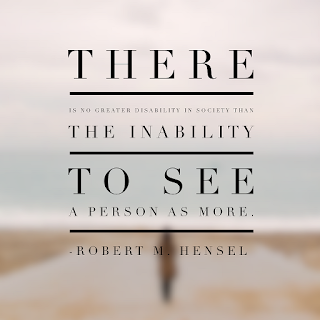I have met so many people who have told me they wish they would have
just died. I'm talking about those who either become disabled due to an
accident or illness sometime later in life. Most individuals born with a
disability are able to adapt so much easier, and are able to embrace
their disability as an integral part of them at an early age. This
doesn't mean they don't have struggles, or have days when they may say,
"I wish I could do that", but overall, many children born with
disabilities are much more accepting of themselves at an earlier age.
Now, we adults and older children, we are a different story. I will admit, I had my days when I thought, "It would be better if I wasn't here". The thought of not having to go through the daily pain, the stares, the negativity and the loss was appealing. The loss.... It is so difficult to go through the loss. The loss of what once was. The loss of who you once were. The loss of what you thought you would become. The broken dreams, the heartache, the reality that there are going to be things that I may never do again. These are all feelings that can lead someone to the level of despair that would make them say "It would have been better if I had died".
I'm here to tell you that you are wrong!

No matter what your situation is, it has a purpose. You have a purpose. You may be new to this disabled community, and that is okay. We don't judge. We will embrace you and show you the ropes if you just let down your guard, break down those walls, and let us in. I know how hard it is because I was there. I put up those walls and I didn't want anyone to know what I was going through. I wanted to pretend it was all okay. I didn't want to accept it. I felt like a friend of mine does right now who always says, "If I learn how to do that, then I am giving in to this chair". You aren't giving in by embracing the wheelchair, the walker, the cane, the braces, the seeing eye dog, the hearing aids, the prosthetic, the depends, the catheters, the shunts, the implants, the sign language, and on and on. It isn't giving in, or giving up. Learning to use the tools around you to live an active, healthy life is just part of the process of learning to love yourself again. You must learn to love you, and that means every part of you. You can't be embarrassed about who you are and what your needs are. The people who truly love you don't care about the chair, the catheters, the dogs, the hearing aids, the braces, the depends, etc. They don't care, and you shouldn't either. It took me a LONG time to learn that. After I learned to embrace it I realized that I was the only one holding me back because everyone else had already accepted me.
At some point we all need to learn to let go of what we once were, and learn to love who we are now. Embrace all that we are because what we can be is amazing. I have met so many amazing people because of my disability. My disability has opened the door to an entire world that didn't exist for me before. It has made me a better person. I can relate to my relative who I loved dearly who went through similar struggles and did amazing things. I can better understand how he felt on some level, and maybe carry on his legacy of helping others. I have been able to reach out to children who are struggling just as I did, and I have seen them conquer their struggle while learning to embrace their disability.
I have met so many people who have been injured, or have a debilitating disease that began later in life, who have told me if they had a choice to go back to who they were before they wouldn't. They have embraced their new identity, and they have learned that there was a reason for it. They have seen the good things that have come from their experiences, and they don't want to change it. It took some of them years to come to that realization, and some of them went through very dark times before they got there. Unfortunately, being in that place of despair can lead to so many dangerous things such as alcoholism, substance abuse, risky behaviors, depression, and suicide. We need to come together as a community and help each other through that difficult time so the transition isn't so difficult for the next person. These individuals who have learned to embrace their disability are necessarily happy with every aspect of their disability. Everyone has daily struggles that they must overcome regularly when living with a disability, and I am not discounting that. But, those daily struggles make us stronger, and over time you will begin to see the good things that will come from your situation.

I don't know what my future holds. It is scary to think about what my disease could do to me. I don't know how it will progress, but I do know that no matter what, I will embrace it and know there is a reason to live. Each and every one of us has to learn to let go of the person we thought we were going to become, and make a new future for ourselves. It doesn't mean that it is an inferior future to the one for which we were previously on track, it is just a different one. One day, you may just come to realize that your new future is the one that was meant for you all along.











